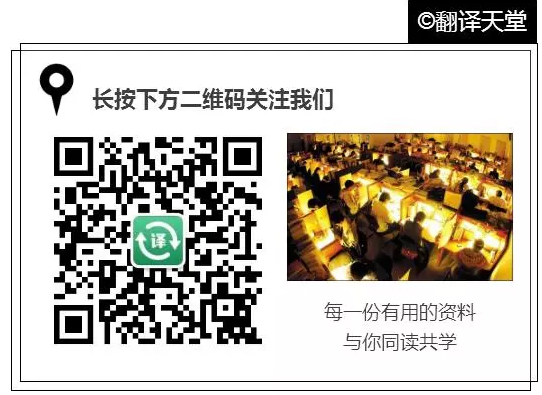翻译天堂 2016-10-03
周游
弗朗西斯·培根
TRAVEL, in the younger sort, is a part of education, in the elder, a part of experience. He that travelleth into a country, before he hath some entrance into the language, goeth to school, and not to travel. That young men travel under some tutor, or grave servant, I allow well; so that he be such a one that hath the language, and hath been in the country before; whereby he may be able to tell them what things are worthy to be seen, in the country where they go; what acquaintances they are to seek; what exercises, or discipline, the place yieldeth. For else, young men shall go hooded, and look abroad little. It is a strange thing, that in sea voyages, where there is nothing to be seen, but sky and sea, men should make diaries; but in land-travel, wherein so much is to be observed, for the most part they omit it; as if chance were fitter to be registered, than observation. Let diaries, therefore, be brought in use. The things to be seen and observed are: the courts of princes, especially when they give audience to ambassadors; the courts of justice, while they sit and hear causes; and so of consistories ecclesiastic; the churches and monasteries, with the monuments which are therein extant; the walls and fortifications of cities, and towns, and so the heavens and harbors; antiquities and ruins; libraries; colleges, disputations, and lectures, where any are; shipping and navies; houses and gardens of state and pleasure, near great cities; armories; arsenals; magazines; exchanges; burses; warehouses; exercises of horsemanship, fencing, training of soldiers, and the like; comedies, such whereunto the better sort of persons do resort; treasuries of jewels and robes; cabinets and rarities; and, to conclude, whatsoever is memorable, in the places where they go. After all which, the tutors, or servants, ought to make diligent inquiry. As for triumphs, masks, feasts, weddings, funerals, capital executions, and such shows, men need not to be put in mind of them; yet are they not to be neglected. If you will have a young man to put his travel into a little room, and in short time to gather much, this you must do. First, as was said, he must have some entrance into the language before he goeth. Then he must have such a servant, or tutor, as knoweth the country, as was likewise said. Let him carry with him also, some card or book, describing the country where he travelleth; which will be a good key to his inquiry. Let him keep also a diary. Let him not stay long, in one city or town; more or less as the place deserveth, but not long; nay, when he stayeth in one city or town, let him change his lodging from one end and part of the town, to another; which is a great adamant of acquaintance. Let him sequester himself, from the company of his countrymen, and diet in such places, where there is good company of the nation where he travelleth. Let him, upon his removes from one place to another, procure recommendation to some person of quality, residing in the place whither he removeth; that he may use his favor, in those things he desireth to see or know. Thus he may abridge his travel, with much profit. As for the acquaintance, which is to be sought in travel; that which is most of all profitable, is acquaintance with the secretaries and employed men of ambassadors: for so in travelling in one country, he shall suck the experience of many. Let him also see, and visit, eminent persons in all kinds, which are of great name abroad; that he may be able to tell, how the life agreeth with the fame. For quarrels, they are with care and discretion to be avoided. They are commonly for mistresses, healths, place, and words. And let a man beware, how he keepeth company with choleric and quarrelsome persons; for they will engage him into their own quarrels. When a traveller returneth home, let him not leave the countries, where he hath travelled, altogether behind him; but maintain a correspondence by letters, with those of his acquaintance, which are of most worth. And let his travel appear rather in his discourse, than his apparel or gesture; and in his discourse, let him be rather advised in his answers, than forward to tell stories; and let it appear that he doth not change his country manners, for those of foreign parts; but only prick in some flowers, of that he hath learned abroad, into the customs of his own country.
周游之于后生,为教育之一端,之于长者,为经验之一端。语言未入门,而周游异国,可谓求学,而非周游。后生周游,有塾师或品行端方之家仆跟随左右,予以为然哉。同行者理应通晓言语,且前此旅次彼国;故可晓示所到之国值得观光之面貌,值得探访之相识,值得见识特有之礼数风教。其余种种,行踪所至,后生宜戴面罩,宜少游目。海路行程,天水相接,别无所见,当记日记;然陆地周游,风土人情目不暇接,多半略而不记;仿佛缘分而非观感更宜记载;咄咄怪事也。故日记应蔚成风气。需要目睹观察者如次:王公贵族之宫廷,召见使节之际尤为重要;公审法庭,坐堂问案;乃至教会议会;教堂寺院,残墓碎碑;城镇之墙垣要塞,港口码头;古迹遗址;藏书楼;学府,论辩,讲学,不可疏漏;海运船队;都市附近楼宇庭院,游乐场所;军械武库;交易场所;仓库;马术操练,击剑,兵操;上流人士观赏之喜剧;珠宝器服之珍藏;稀有珍品之陈列;总之,所到之处凡值得纪念者,理应见识。凡此种种,塾师家仆务必勤力访求。而盛典,假面舞会,筵席,婚宴,丧葬,刑场一类场面则无需提醒,然亦不可忽视。倘要后生记述周游见闻,时光短促而广采博收,必须有所造诣。起程之前,语言需入门。携带谙于国情之家仆或塾师。令其随带导游地图或观光指南;此乃探胜之诀要。令其日有所记。令其勿滞留一城一镇;各地俱有可观之处,然勿盘桓不去。所至城镇,令其旅次异地而居,交游广泛。令其谋求当地显贵为之先容,凡所下榻之处,以此为要;可利用显贵之影响,所要见识了解之风物民情遂易于采访。故行程可缩短且获益良多。旅途中应该结交何人,莫大受益者为结识使节秘书和雇员;在一国旅行时,可以吸收众人之经验。令其拜访各类人中之杰,惟其在海外享有盛名,由此便能够断定诸位名实相副与否。理应小心谨慎,避免争吵:通常因情人、祝寿、名次、言语而引起争吵。令其留意与易怒好斗之辈交往方式;此辈中人会将其卷入自家争吵。周游归国之后,不可将周游各国置之脑后,而应与十分值得结交者保持书信来往。周游见闻宜行诸于谈吐之间,不必表现于服饰举止;谈吐之间宜三思而后应答,不必主动娓娓而谈;令人觉其并未改变本国风俗而照搬域外风俗,无非摘取一点国外见闻的精华而移入本国风俗。
杨自伍 译











